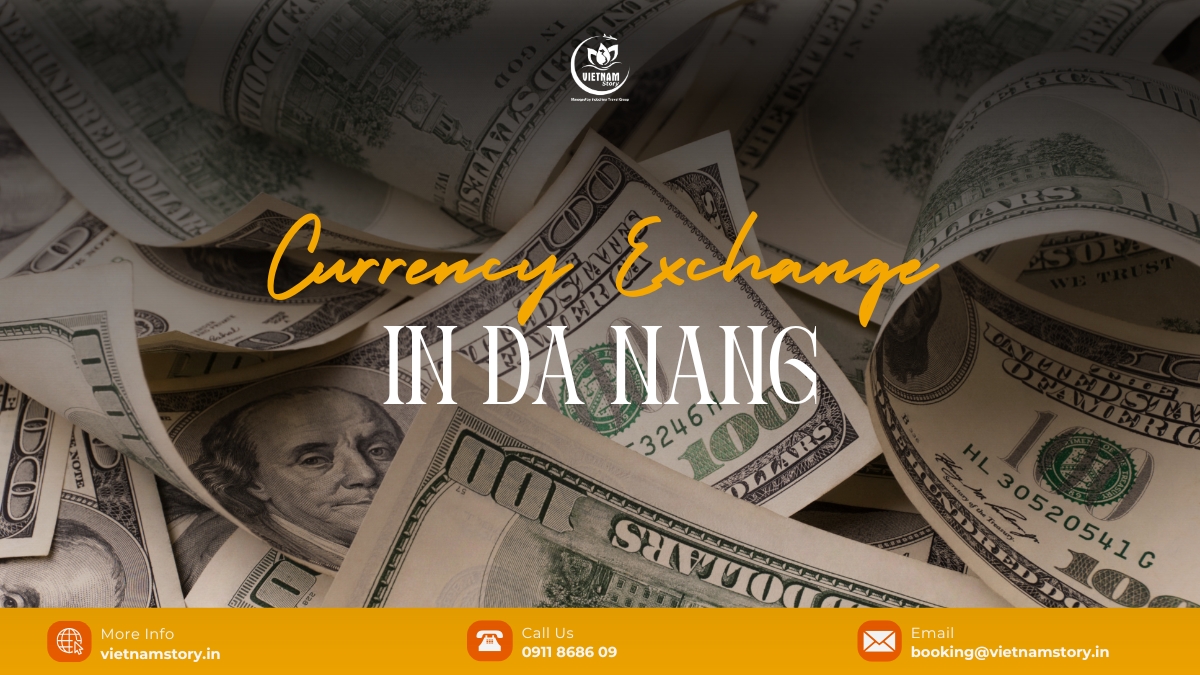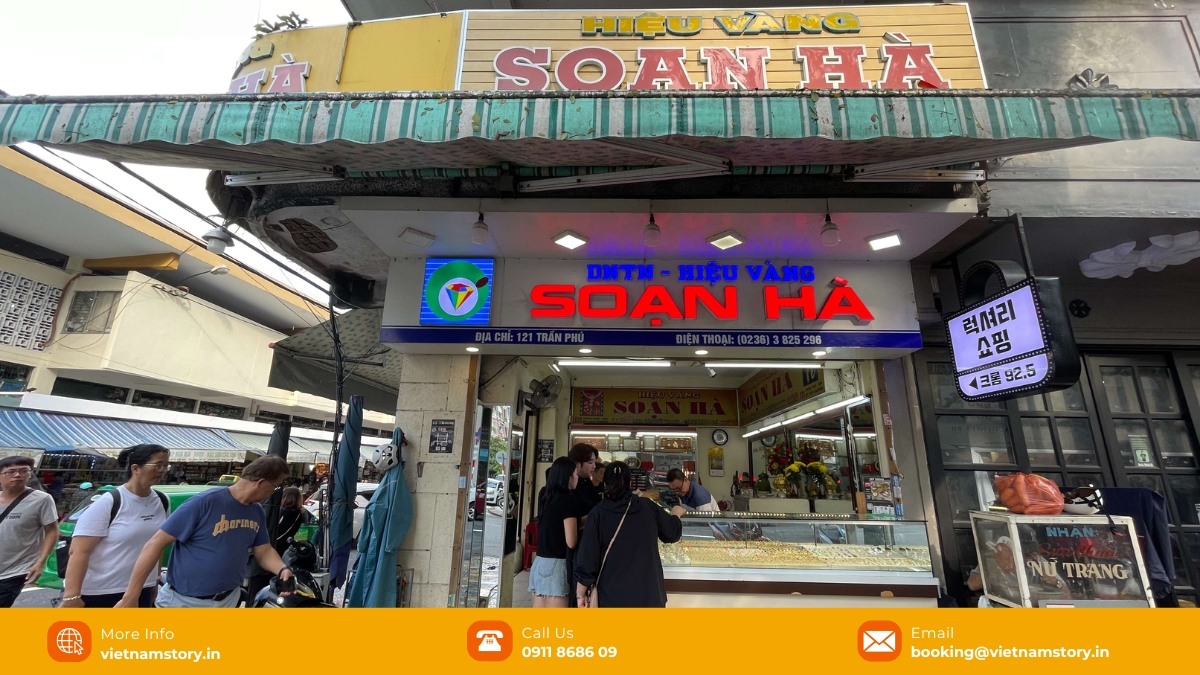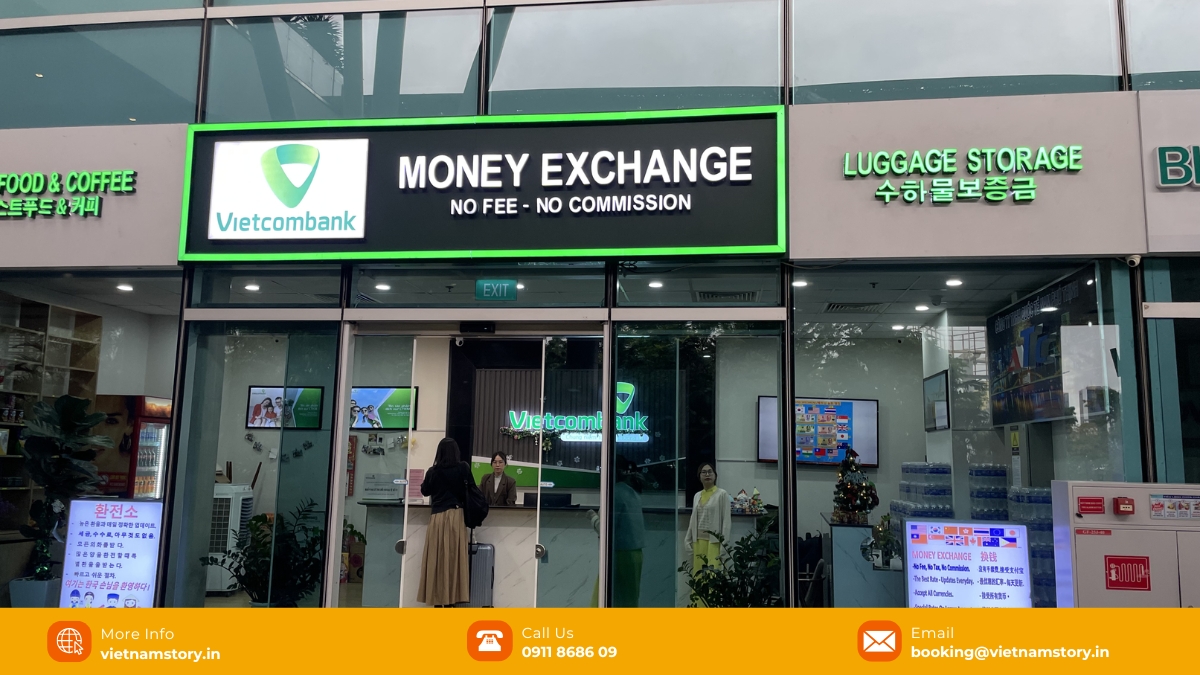For Indian travelers visiting Da Nang, converting your currency into our local Vietnamese Dong (VND) safely and at the best possible rate is key to a smooth and worry-free holiday. While you will find that credit cards and digital payments are becoming more common in hotels and large restaurants, cash is still king in Vietnam. You will absolutely need cash for all the best things: delicious street food, shopping for souvenirs at the local markets, paying for taxis, and buying things from small, family-run shops.
This guide, brought to you by Vietnam Story, will detail the best, safest, and most convenient places to exchange your money. Our goal is to give you the confidence to manage your finances easily, so you can focus on enjoying every magical moment of your trip.

Best places to exchange currency in Da Nang
The best place to exchange your money is a balance of getting a great rate while ensuring the process is safe and transparent. Based on our experience, here are the best options, listed in order of which one will likely give you the most Dong for your money.
| Location | Safety & transparency | Typical exchange rate | Convenience & hours |
| City Gold Shops (Licensed) | High (Use official, licensed shops only) | Best (Often slightly better than banks) | Variable; generally 8:00 AM – 8:00 PM. Very convenient. |
| City Banks (e.g., Vietcombank) | Highest (Government regulated) | Very Good (Standard published rates) | Weekdays only; typically 7:30 AM – 4:30 PM. Closed on weekends. |
| Da Nang Airport (DAD) | High (Reputable vendors) | Fair to Good (Lower than city center) | 24/7 at the International Terminal (T2). The most convenient upon arrival. |
Banks (The safest & most transparent option)
For travelers who prioritize safety and official documentation above all else, banks are the best choice.
- Best banks to look for: Vietnamstory.in recommends using major national banks like Vietcombank, Eximbank, VietinBank, or BIDV. You will see their branches all over the city.
- Procedure & documentation: This is a very important detail. To exchange money at a bank in Vietnam, you must always present your Passport. The transaction is very formal. The exchange rates are clearly displayed on a digital board, and you will be given an official receipt for your transaction.
- Convenience: The main drawback is their limited hours. Banks are only open on weekdays from Monday to Friday and are closed on weekends and public holidays. This can be inconvenient if you arrive on a Saturday.
READ MORE: Vietnam Money & Currency Guide for Indian Tourists: VND, Payments & Tips
Licensed Gold & Jewelry Shops (The best rates)

Nang offer currency exchange services,
This might surprise you, but in Vietnam, authorized gold and jewelry shops often offer the most competitive exchange rates in the city, usually slightly better than what you will find at the banks.
- Recommendation: Do not go to just any small shop. Look for large, well-established, and reputable gold shops, especially in the city center. A licensed shop will often have a sign that clearly says “Money Exchange” or “Đổi Tiền.”
- Safety tip: This is a crucial piece of advice. After you hand over your foreign currency and they give you the Vietnamese Dong, always count the money carefully right there in front of the teller before you leave the counter. This simple step ensures there are no mistakes.
Official counters in malls and at the airport
These are extremely convenient and reliable options, offering good rates that are usually similar to or just slightly lower than the city banks.
- Shopping malls: Large, modern shopping centers like Vincom Plaza and Lotte Mart often have official bank branches or licensed currency exchange booths inside. This is a great option as it allows you to combine exchanging money with a bit of shopping in a comfortable, air-conditioned environment.
- Da Nang Airport (DAD): When you first arrive at the international terminal, you will see several currency exchange counters. Our advice is to only exchange a small amount here ($50 to $100 USD). This will be enough to pay for your taxi to the hotel and your first meal. The rates in the city center will always be slightly better, so you can exchange the rest of your money there the next day.
- Available currencies: These places will exchange a wide range of currencies. While some major banks may exchange Indian Rupees (INR), the US Dollar (USD) is the most universally accepted foreign currency and will almost always give you the best exchange rate.
ATMs and Digital Cash withdrawal
Using an ATM is a very efficient and often cost-effective way to get Vietnamese Dong directly from your Indian bank account or a travel card.
- Widespread availability: You will find ATMs everywhere in Da Nang – outside banks, inside shopping malls, and on all the main streets. Look for ATMs from major banks like Vietcombank, ACB, and Sacombank.
- Foreign card acceptance: Almost all ATMs will accept cards with Visa, Mastercard, Maestro, or Cirrus logos.
- Withdrawal limits: This is an important point. Most ATMs have a maximum withdrawal limit per transaction, usually between 2,000,000 VND and 3,000,000 VND (which is approximately ₹6,700 to ₹10,000). Some banks like Agribank or Vietcombank might offer slightly higher limits.
- Fees: Be prepared for two types of fees. The local Vietnamese bank will charge a small fee for the transaction (usually between 25,000 VND to 50,000 VND). On top of this, your own bank in India will likely charge a fee for the international withdrawal.
- Vietnam Story expert tip (Dynamic currency conversion): This is a very important tip that can save you money! When the ATM asks you if you want to be charged in your home currency (INR) or the local currency (VND), ALWAYS choose to be charged in VND (Vietnamese Dong). If you choose your home currency, the ATM operator will use their own, less favorable exchange rate. Choosing VND ensures that your own bank’s much better exchange rate is used.
Safety and currency exchange best practices

exchange currency upon arrival in this beautiful city.
Follow these simple rules for a safe and smooth experience.
- Monitor rates in real-time: Before you go to exchange a significant amount of money, use a reliable app on your phone (like Wise or XE Currency) or a quick Google search to check the current mid-market exchange rate. This will give you a good idea of what a fair rate should be and will help you quickly assess if the rate you are being offered is competitive.
- Avoid unofficial exchanges: Never, ever exchange money with someone on the street, in a random small shop, or at your hotel. Only use the official places Vietnamstory.in has listed: bank counters, airport booths, and licensed gold shops. This will completely eliminate the risk of scams or being given counterfeit money.
- Check your dong: Our Vietnamese currency has a lot of zeros, which can be confusing at first! When you receive your VND, take a moment to count the bills carefully and familiarize yourself with the different denominations. The 100,000 VND note (green) and the 10,000 VND note (brownish-yellow) can sometimes look similar to a tired traveler, so pay close attention.
- A note on hotels: Your hotel or resort will almost certainly offer a currency exchange service for guests. However, their rates are almost always the lowest and least favorable. We only recommend using this service for a very small amount in an absolute emergency.
READ MORE: Your Essential Guide to International Airports in Vietnam for Indian Traveller
Conclusion
Navigating a new currency is an essential part of any international adventure, and in Da Nang, you are now fully equipped to do it with confidence. You know where to find the best rates, how to use an ATM smartly, and what simple steps to take to ensure every transaction is safe. This knowledge empowers you to explore the city’s vibrant markets and local eateries, connect with our culture on a deeper level, and make the most of your travel budget. You are not just a tourist; you are a savvy and prepared traveler.
Let Vietnam Story be your trusted partner on the ground. While you confidently handle your daily expenses using these tips, we will ensure that the rest of your journey – from your private transfers to your guided tours – is perfectly arranged. Get in touch with us, and let’s build an itinerary that empowers you to have the most authentic Vietnamese experience possible.









